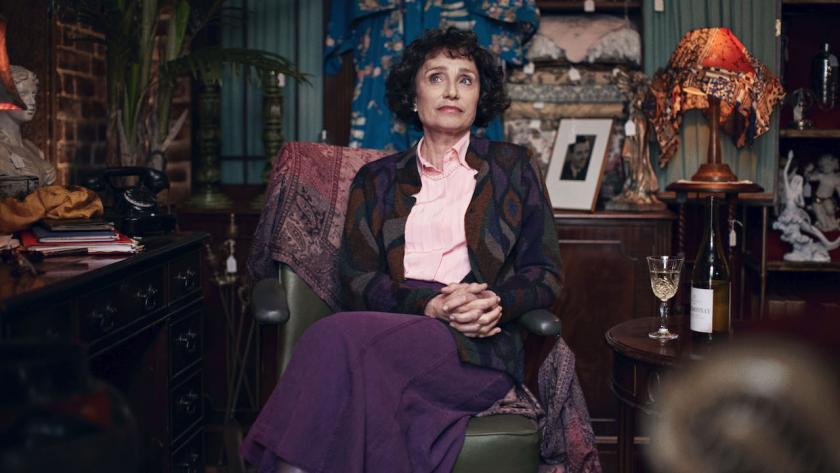For some of us, it doesn’t take a lockdown to imprison us in our own hellish little world. Since his first series of dramatic monologues, broadcast on the BBC in 1988, Alan Bennett has taken a scalpel to the mindsets of those who have battled life’s disappointments and disillusionments by creating their own, often equally destructive, realities.
The Bridge Theatre collaborated with the BBC to revive these gems of frustration and disquiet, releasing them in early June at a point when theatre still looked like an impossible dream. The Outside Dog and The Hand of God form one of the double bills now playing at the theatre itself, both exquisitely demonstrating the paradox that sometimes it’s only through talking to a crowd that you demonstrate what it’s like to be truly alone.
Rochenda Sandall appears as Marjory (pictured below), a woman whose most significant relationship is with her obsessive cleanliness. “We don’t have any flowers,” she declares proudly early in the monologue. Her eyes flicker to a nearby vase. “Well we do,” she corrects herself, walking over and stroking a plastic leaf, “but they’re washable.”
Julie Walters first played the role when the monologue was first broadcast in 1998, but Line of Duty’s formidable Sandall makes it her own with a gritty clench-teethed energy. In her surgically pristine kitchen, she starts to tell us about the dirty blood-stained world of her husband, Stuart, who works in a slaughterhouse and spends the late nights roaming the surrounding countryside with his Alsatian, Tina.
 Part of the warped beauty of Bennett’s monologues is that they allow you to think that you’ve worked out something before the character has, only for you then to question that when you consider the character’s behaviour throughout. It doesn’t take long, after Marjory mentions that women have been going missing, to think that Stuart might be a killer. She herself expresses surprise when the police finally turn up. Yet her demeanour throughout is that of a woman who believes that if she relaxes for a second her world will fall apart, and you realise the extent to which her obsessive compulsion is an attempt to stifle unpalatable suspicions.
Part of the warped beauty of Bennett’s monologues is that they allow you to think that you’ve worked out something before the character has, only for you then to question that when you consider the character’s behaviour throughout. It doesn’t take long, after Marjory mentions that women have been going missing, to think that Stuart might be a killer. She herself expresses surprise when the police finally turn up. Yet her demeanour throughout is that of a woman who believes that if she relaxes for a second her world will fall apart, and you realise the extent to which her obsessive compulsion is an attempt to stifle unpalatable suspicions.
Nadia Fall’s beautifully balanced production – in which projections on screens subtly convey the monologue’s shifting moods – is succeeded by Jonathan Kent’s direction of Kristin Scott Thomas as a petit bourgeois antiques dealer. It’s a difficult tonal shift, not least because Celia is worlds away from the urbane sophisticates normally played by Scott Thomas. Yet Scott Thomas’s deft and stylish sense of comedy allows her to mine Celia’s cynical snobbery so that at the same time we are laughing at her more grotesque aspects we also gain a sense of her vulnerability. Part of the point of these monologues is that people who would normally be dismissed as minor characters or simply caricatures are allowed to exist in all their dimensions, no matter how malevolent some of those may be.
T.S. Eliot’s Alfred J Prufrock measured out his life in coffee spoons, but Celia measures hers out in good antique cottage furniture and clocks. Hilariously she declares, "Laurence – he was in bomb disposal which is why we went in for clocks in the first place." Objects mean much more to her than people, as is made clear in the dark comedy of her predatory visits to a dying neighbour with a 17th century house. Yet her covetous snobbery – not least in relation to the employees of Christie's and Sotheby’s who she dismisses as “barrow boys” – will also prove to be her tragedy.
Like any gem, each script reveals new aspects according to the different lights shone on them, and there is much to reflect on when looking back on the evening. The wry comedy of the inevitable collision between Marjory’s obsessive cleanliness and the forensics team that comes to search her and Stuart’s house. The questions about what might have happened to Celia to make her seek comfort in objects rather than humans. Lines that are laugh-out-loud that are also underscored by tragedy. "In the middle of it I thought it was a blessing we were [in a] detached [house]," Marjory reflects after brutal and loud sex with her husband; while the sentiment seems trivial, it also conveys the increasing sense that his intimacy is a form of abuse.
This is another inspired evening from Nicholas Hytner, who is proving one of the leaders in this strange new climate in which any type of collective gathering feels like a privilege. Top class acting and top class writing that shows theatre at its best. Whatever our thoughts about the characters, the events of the last few months have made us all reflect on the extent to which we alternate between denial and reality. And, indeed, the limits of our own little worlds which now threaten to get much smaller again before society as a whole can recover.
- The Outside Dog and The Hand of God at the Bridge Theatre until September 26
- More theatre reviews on theartsdesk















Add comment